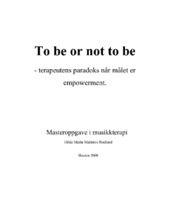| dc.description.abstract | To be or not to be - the therapist's paradox when the aim of therapy is empowerment The basis for this research project was my own personal curiosity regarding which role I should assume in a music group consisting of autonomous and independent participants. Autonomy and independence are important elements in empowerment philosophy, which focuses highly on resources. The relationship between therapist and client is based on mutual collaboration, wherein the client is actively involved in nurturing his or her own health. Therapy can in its simplest form be understood as giving help to a client. This definition of the term, however, can turn the therapist's role into something of a paradox, when the aim of therapy is empowerment. The title of this research project thus became: Which function, according to the empowerment philosophy, does a music therapist have in a music group for immigrant mothers and children? Through empirical research the three key elements of empowerment philosophy, namely participation, mutuality and joint decision-making, were substantiated in a discussion of to which degree expert knowledge should be utilised, and the importance of context for such therapeutic work. Empowerment philosophy allows for the use of expert knowledge, although always keeping in mind the importance of the context and culture of the participants. The music therapist's role according to empowerment philosophy changes the therapeutic context by stressing the therapeutic framework, the therapist's work methods and the therapist-client relationship. | en_US |
